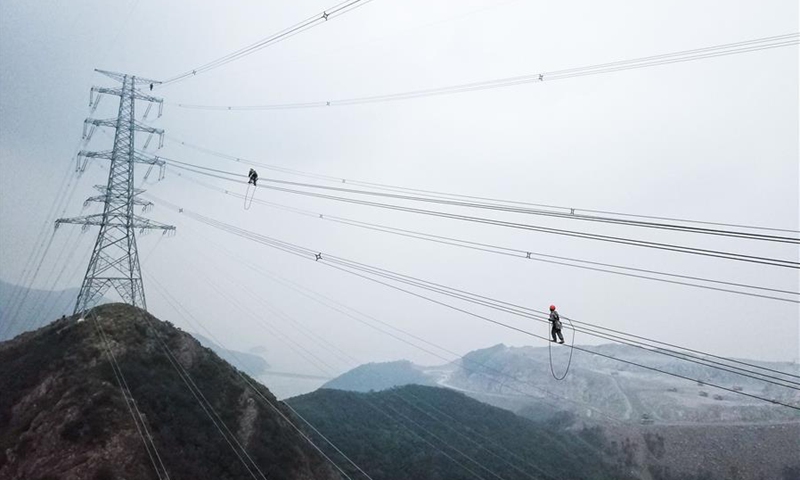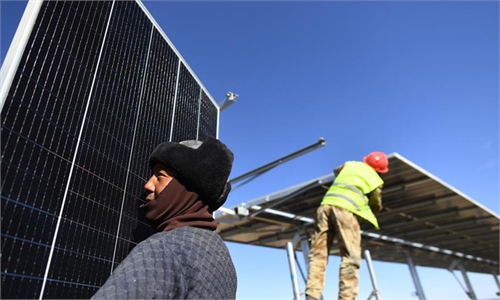China’s electricity supply and demand in balance, residential supply guaranteed
Looming cold wave may put swathes of China under pressure

Aerial photo shows technicians of State Grid Zhejiang Electric Power Company checking power transmission lines to make sure the stable operation of local power supply in Zhoushan, east China's Zhejiang Province, Oct. 23, 2020. (Xinhua/Xu Yu)
China's electricity supply and demand are in balance, with residential supply guaranteed, said China's top economic planner on Monday, noting that it can ensure a "warm" winter for the residents, though some areas may see increased pressure to guarantee supply.
The National Development and Reform Commission (NDRC), together with other government agencies, said it has made some advance plans and "full preparations" for a shortfall in power supply.
The remarks come as media reports said some areas in China are expected to experience a cold spell in the coming days, leading to a surge in electricity demand. Regional power shortages have occurred in several provinces already, with some localities curbing electricity use.
Power shortages and rationing were experienced in Central China's Hunan Province, and East China's Zhejiang and Jiangxi Provinces, in mid-December, local media reported. Residents and companies reached by the Global Times previously in the provinces said they've run into a different level of power blackouts or brownouts, with their business operations affected.
Cold weather, combined with rapidly expanding industrial production and limited power supply capacity, created a surge in electricity demand and led to the outages in Hunan and Jiangxi, the NDRC said, adding that efforts to control energy consumption and energy intensity as well as reduce the use of coal to protect environment, resulted in blackouts in some areas in East China's Zhejiang Province.
However, with immediate measures to handle the situation, Hunan restored power supply, Jiangxi hasn't tightened power supply since December 19, and intermittent blackouts in Zhejiang have been rectified, according to the NDRC. Electricity supply and demand are now stable, it said.
"I saw advertising screens in some shopping malls in the city have been turned off, but electricity supply for homes is adequate," a white-collar worker surnamed Zhong in Changsha city, Hunan Province, told the Global Times on Monday.
An employee of the All Seasons hotel branch near Changsha's railway station surnamed Shen said there was an unannounced blackout in the middle of December, but the impact was limited since it only lasted for a few hours.
Shen said that the blackout affected not only her hotel, but almost all the hotels and other businesses in the region. Shen said they have been told that there should be no more switch-offs in the coming days.
The owner of a small commodities factory surnamed Jin in Yiwu, Zhejiang Province, told the Global Times that there was an electricity outage in December for unknown reasons, but there has been no impact on businesses after its swift resumption.
"The government has made efforts to ensure the electricity supply for local factories, including those for exports like this," said Jin, who exports Christmas-related products.
"The NDRC's remarks are a regular routine every winter, as an extreme weather condition will no doubt lead to pressure on power supplies," Lin Boqiang, director of the China Center for Energy Economics Research at Xiamen University, told the Global Times on Monday.
"I don't see there will be any problems in the country's power supply during the coming weeks, as long as the extreme weather pattern will not last. There's nothing to be worried about now," Lin said, adding that China has an oversupply of both electricity and coal.
China will guide major coal-producing areas and major coal companies to speed up production, and "do everything possible" to meet coal demand in preparing for the coming cold wave, said the NDRC.
China will also "modestly" increase coal imports based on the supply and demand situation, noting that coal should be first used for power generation and heating, according to the ministry.
Analysts again refuted foreign media reports that the power shortages were caused by declining imports from Australia, noting that Australia's share of China's coal imports is low, and China has enough import sources, such as Indonesia and Mongolia, to ensure coal supply

